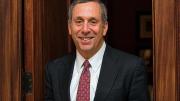One of the first complaints I received after my election as president was a strongly worded email about a course being offered at Harvard College. It contained a link to an article, shared hundreds of times over, that simply juxtaposed the course description with an opinion piece about the instructor and a full-throated criticism of higher education. This so-called news was nothing new to me. What was new to me, however, was my correspondent’s own admission that the information he had read might not be entirely accurate. “It appears,” he wrote, “to be a true story.” He rushed to judgment and decided it was more important to let me know how the University had failed in its mission than to scrutinize his source.
These are tough times for truth. The editorial function has been disintermediated by technology. In times past, it was difficult to publish widely without access to a distribution channel. One could not gain access to print or electronic media without first being reviewed by an editor. The internet has bypassed all such fact checking. As a result, anyone can spread misinformation and disinformation, sometimes without knowing that he or she is doing so. Even the shrewdest consumers of knowledge succumb to the lure of the likeminded crowd, and I will venture a guess that each of us has at least once failed to engage someone who thinks differently for fear of disagreement and discomfort. We are everywhere faced with the consequences of these actions—a society in which the appearance of truth is considered as good as truth itself.
None of us can afford to turn inward at this moment. We must defend truth and demonstrate its enduring power to do good in society. Harvard—and colleges and universities across the country—play an essential role in preparing citizens to read, watch, and listen to news actively; to question sources of information and their veracity; and to differentiate signal from noise in a cacophonous world. A broad liberal arts education—and its emphasis on critical thinking and rational argument—has never been more important, and our students grow intellectually in ways that will prepare them not only to seek truth and wisdom, but also to become sources of both. At the same time, faculty in nearly every field and discipline model these behaviors as they debate and marshal evidence in support of their ideas and theories, expanding what we know of the world as they enlarge our aspirations for what humanity might achieve in the years to come.
The arc of human achievement reveals that the greatest gains are often the hardest won. Overturning conventional wisdom and upending the status quo take a remarkable amount of grit and determination, as well as an unflagging willingness to welcome contrary views and to risk being proved wrong. We must appreciate diversity in every possible dimension; we must invite to our campus those people who challenge our thinking; we must listen to them carefully and thoughtfully. Most of all, we must embrace the difficult task of being quick to understand and slow to judge. If we cannot achieve that aim at Harvard, where the freedom to speak one’s mind and act on one’s beliefs is a defining precept, then what hope can we have for the rest of the world?
Every day I have spent as president has been a powerful reminder to me of the role that Harvard must play in underscoring the value of truth and wisdom. Veritas persists only with perennial effort. It must be discovered and rediscovered with great patience and care, and it must be subjected often to the rigors of argument and experiment. We undertake that work at Harvard every day, and we will continue to strengthen our community in ways that demonstrate the power of bringing together people from all backgrounds. Our task now is to make sure that more people understand and appreciate the nature of our efforts—and the meaning of our motto.









